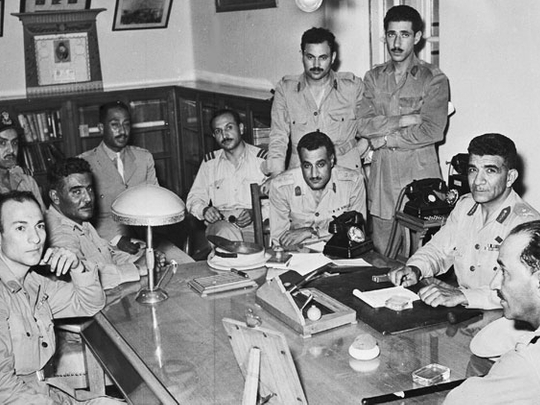
Cairo: Flocking to Cairo’s iconic Tahrir Square to demand the ouster of two unpopular presidents in the past three years, many Egyptians carried the portraits of Jamal Abdul Nasser, who led a group of army officers and toppled the country’s monarch on July 23, 1952.
A Popular uprising forced Hosni Mubarak, who ruled Egypt for 30 years, to step down in February 2011. His Islamist predecessor Mohammad Mursi was deposed by the army on July 3, 2013 following days of massive rallies demanding his resignation.
“Despite all these years, the 23rd July revolution and its leader Abdul Nasser are still fondly remembered because this revolution has changed the face of Egypt,” said Mustafa Mukhtar, a schoolteacher. “This revolution is credited with turning millions of poor families into landlords, providing Egyptians free education and starting a strong industrial renaissance, whose results were unfortunately wasted by the Mubarak regime through its questionable privatisation programme,” Mukhtar told Gulf News. “No wonder, in hard times Egyptians always remember Abdul Nasser because he was a sincere leader.”
Three weeks after the army overthrew Mursi, one year after he took office, several revolutionary groups and leftist parties held major ceremonies to mark the 1952 revolution anniversary.
The Muslim Brotherhood, to which Mursi belongs, has made no bones about its hostility towards the revolution and Nasser. There is little that is surprising about this sentiment. Nasser banned the Islamist group in 1954 and heavily cracked down on its members after he had survived an attempt on his life that was blamed on the Brotherhood.
“Their animosity against the 23rd [July] revolution and Nasser was one of the mistakes that further widened the gap between the Brotherhood after reaching power and the people,” said Mukhtar. “The majority of Egyptians still hold Abdul Nasser in high regard despite the fact that he died 43 years ago.”
Nasser’s youngest son Abdul Hakim frequently participated in the anti-Brotherhood protests in the past year and drew praise from fellow demonstrators.
“On the 61st anniversary of the revolution, we renew our pledges for social justice and national dignity,” said Hamdeen Sabahi, a prominent leftist leader. “Greetings are to the revolution, the revolutionaries and to the struggling leader and Egypt’s devoted son, Jamal Abdul Nasser, Sabahi, a former presidential contender, said in a tweet.
In a televised address on the eve of the revolution anniversary, interim President Adly Mansour lauded the event as “one of the greatest revolutions in the 20th century”. Mansour, a top judge installed after Mursi’s removal, used the anniversary as an occasion to call for national reconciliation. “It is high time to reconcile with the past... and open a new page in the nation’s book without rancour or hatred,” he added, apparently referring to the Brotherhood that has vowed open-ended street protests until Mursi is restored to power.











